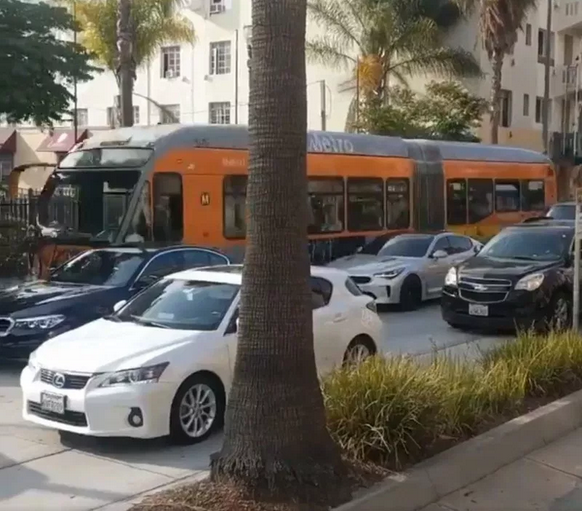Note: GJEL Accident Attorneys regularly sponsors coverage on Streetsblog San Francisco and Streetsblog California. Unless noted in the story, GJEL Accident Attorneys is not consulted for the content or editorial direction of the sponsored content.
Right after revoking California's ability to regulate vehicle emissions, the federal EPA declared that, because California's air is so polluted, the government might take away billions of dollars in highway funds from the state. In the words of the EPA, after undercutting stronger vehicle emission requirements, the agency is "taking action" to make sure California meets air quality standards.
This move was anticipated; CA regional agencies like SCAG and SACOG, that are responsible for writing transportation plans that can meet federal air quality rules, warned months ago that this could happen.
The EPA has been sitting on State Implementation Plans, known as SIPs, that are supposed to show how the regional plan meet air quality standards. The EPA says those backlogged SIPs, never approved, are now out of date, won't reach air quality targets, and must be redone. If not, the EPA will disapprove them.
California leaders say the letter is inaccurate, and that some of the areas it mentions are in compliance. Nevertheless, the letter threatens consequences: the feds could put a hold on all federal highway funding for California, and they could step in to create their own implementation plans for California regions.
If the EPA were sincere about cleaning up California's air, instead of just picking fights with California, one might think that holding back highway funds could be a good thing. From a federal administration truly concerned about the environment, highway spending cuts could have positive outcomes, such as cleaner air, better health, and fewer greenhouse gas emissions disrupting the climate. But the EPA has been rolling back and weakening clean air and environmental policies since Trump took office, making this look like no more than a hypocritical counterattack against California for opposing the feds on multiple fronts, prominently on automotive emissions.
The thing is: California could do better. Its SIPs and Regional Transportation Plans rely too much on the ability to regulate emissions coming from vehicles. Meanwhile California's regions continue to plan and build for single occupancy vehicles, counting on technology to clean up the problem - rather than committing to find ways to help people cut down on driving.
Even in the midst of the hand-wringing about the consequences of being out of attainment - which are most definitely severe - regional and state leaders have been more worried about losing money than about the poor quality of the plans. The highly charged political process of rewriting them, they said, would just be too onerous a task to undertake. It would take too long, and agreements are so difficult to achieve.
But those plans need rewriting. For all its hypocrisy, on this one thing the EPA has it right. The Federal Clean Air Act even offers a few ideas for strategies it might impose. They are listed in Section 179, which discusses sanctions and consequences for not complying with the law. At the top: invest in better transit.
States and regions could also incorporate bus and high-occupancy vehicle lanes and entire roads dedicated to transit, or create requirements that employers reduce work-related trip emissions. They could limit or restrict vehicle use in congested areas by using strategies such as congestion charges, parking surcharges, vehicle restriction zones, and vehicle registration programs.
Not very many of these strategies are being deployed in California, and few if any show up in the SIPs.
Some want to see a silver lining here. Maybe the federal threat will push regions to write better plans, and push the state to address what the Air Resources Board and others have been saying all along: clean cars will not be enough.
Jeff Davis of Eno Transportation, for example, thinks that the federal threat "leaves regions free to flex all of their hwy. formula $$ to transit projects. This may be the most pro-transit thing the Trump Admin. has ever done," as he wrote on Twitter.
But some of that threatened funding is meant for transit. And the Trump administration has already been withholding transit funds. The feds are doing this all over the country. They promise congressionally approved funding and then never deliver the money. This is true in California, where funding for L.A. Metro's Purple Line subway extension, has been held up for more than a year because of federal foot-dragging, resulting in major cost increases. The feds have also threatened promised funding for California's High-Speed Rail Program.
Although the letter from the EPA [PDF] was addressed to the California Air Resources Board, other states also have SIPs that are out of compliance with federal air quality attainment. This is not just a California problem.






